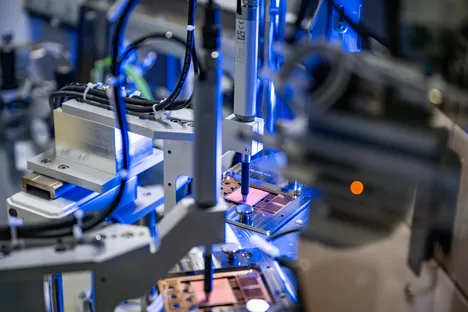Process Interaction Prediction
The results of this project will be uploaded here as a final report by mid-May 2025.
- Sponsored by: Infineon Technologies AG
- Project lead: Dr. Ricardo Acevedo Cabra
- Scientific lead: Dr. Fabian Haas, Dr. Dominic Raithel, Lisa Aschenbrenner, Dr. Jan Papadoudis
- TUM co-mentor: Prof. Massimo Fornasier
- Term: Winter semester 2024
- Application deadline: Sunday 21.07.2024

Motivation
Infineon is a world leader in semiconductor solutions that make life easier, safer, and greener. We are a leading company that is shaping the future of energy efficiency and electrification, empowering a sustainable future with our innovative power solutions. As partner of the TUM-DI-LAB, we are now seeking talented students to join our exciting project in the backend development of our site Regensburg.
With the ongoing trend towards electromobility, Infineon’s solutions for power packages become increasingly important, as the electrical inverter is the center of any electrical drivetrain. Infineon is committed to drive innovation and sustainability in this area and our two German backend sites Regensburg and Warstein are at the forefront of the power package development. We are now lifting our package development to the next level by integrating data science and Artificial Intelligence (AI) into our backend development processes.
Goals
In our proposed project, we are looking for highly motivated students who would like to gain insights into real life semiconductor development and drive the advances of the products of tomorrow. You will support the development of state-of-the-art power packages using your knowledge in data science and AI to anticipate process interactions in the early stages of our product development. By utilizing production and DoE process data, our goal is to identify hidden correlations between assembly processes and then forecast the implications of changes to subsequent processes to streamline and optimize our development.
As a project team member, you will work closely with our development and data science teams and work on live process and measurement data. Your tasks will include:
- Analyze Process Data: Explore and analyze live industry datasets to identify patterns and correlations between production process parameters along the process chain of a semiconductor product.
- Generate Insights: Collaborate with our experts to gain insights into our backend development processes, their interdependencies across each other and show what is hidden in the data.
- Develop AI Models: Design and train AI models to predict process interactions implications and forecast the impact of changes in order to streamline the further development of the product.
- Validate and Test: Verify the accuracy and reliability of the AI-driven predictions and recommendations.
- Report and scale: Visualize the process, create dashboards of the gained insights and think of scaling your solution to other aspects of development.
The vision is to implement an end-to-end methodology that allows our backend development team to have an efficient way for anticipating process interactions, reducing development time and costs. Ultimately, this solution will also serve as a reporting tool and dashboard for our development teams and management.
If you're a motivated student with a passion for AI, data analysis, and interested in real industry development, we encourage you to apply for this exciting project. Don't miss this opportunity to shape the future of power semiconductors and contribute to a more sustainable tomorrow.
Requirements to join:
To ensure a successful and rewarding project experience, we recommend that students should bring some of the following skills and qualities to work best in a diverse team to tackle the project:
- Problem-solving and critical thinking: Ability to break down complex problems into manageable components, think critically, and develop creative solutions.
- Programming skills: Proficiency in programming languages such as Python, R, or MATLAB is essential for data analysis and AI model development.
- Data analysis and visualization: Knowledge of data visualization tools like Tableau or other, and experience with data manipulation tools such as KNIME and analysis using libraries like Pandas, NumPy, or Matplotlib.
- AI and machine learning: Familiarity with machine learning frameworks like scikit-learn, TensorFlow, or PyTorch, and understanding of AI concepts like supervised and unsupervised learning, neural networks, and deep learning.
- Curiosity and enthusiasm: A passion for learning, exploring new ideas, and driving innovation in the field of AI-powered backend development.
Apply to this project here